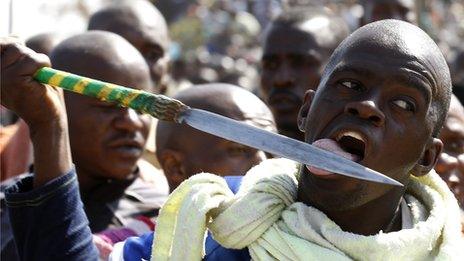Malema, Marikana and Mugabe
- Published
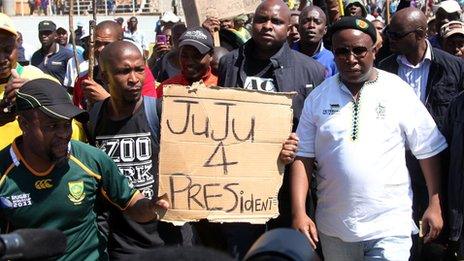
The career of Julius "Juju" Malema (in white) had seemed to be over
Branded a demagogue by his critics, South African youth leader Julius Malema is seen as using the Marikana killings - the most deadly police action since white minority rule ended 18 years ago - to resuscitate his political career.
Mr Malema is hoping that the ruling African National Congress (ANC) party will oust President Jacob Zuma as its leader at its national conference in December - and reverse the decision taken in April to expel him for sowing division in the party.
Since the police shot dead 34 striking workers at the Marikana mine on 16 August, Mr Malema has been touring South Africa's mines, addressing workers and urging them to make the sector "ungovernable". On Tuesday, he called for a national strike to halt production in one of the world's biggest producers of gold and platinum.
Mr Malema is exploiting the killings to reinforce his image as the champion of poor black South Africans, though he also has some support in black business circles, says Johannesburg-based political analyst William Gumede.
He moves with ease between the two groups, toyi-toying (a revolutionary dance popularised during the anti-apartheid struggle) at rallies in shack settlements, before slipping away to leafy suburbs for all-night parties with the nouveau riche.
"It's difficult to put Mr Malema in a box. He uses rhetoric that suits him at a particular time," says Mr Gumede.
He argues that Mr Malema is similar to politicians in Zimbabwe's Zanu-PF party, led by President Robert Mugabe.
"They express conservative views on social issues [for instance, gay rights]. When it comes to economics they use socialist rhetoric but they are, in fact, capitalists who use the state to advance their own political and business interests."
One of his first run-ins with the ANC leadership came in 2010, when he praised Robert Mugabe's seizures of white-owned land.
'Worse off in democracy'
Since the killings at Marikana mine - owned by Lonmin, which is listed on the London and Johannesburg stock exchanges - Mr Malema has stepped up his long-standing calls for mines to be nationalised.
"The British are making money out of this mine... It is not the British who were killed. It is our black brothers," he said, using rhetoric similar to that of Zanu-PF.
He also portrayed Lonmin director and ANC heavyweight Cyril Ramaphosa - who was a leading trade unionist during white minority rule - as a puppet of whites and foreigners.
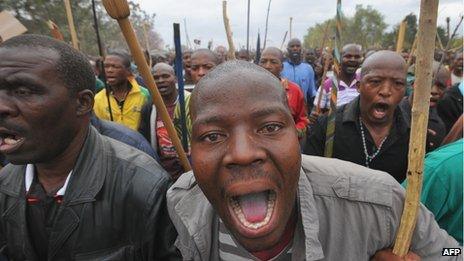
Many poor South Africans are becoming increasingly angry with the government
"Every mine has a politician inside. They [whites] give them money every month, they call it shares. But it is a protection fee to protect whites against the workers," Mr Malema alleged.
Mr Gumede says the "populist" rhetoric strikes a chord with many poor black people.
"As far as a miner living in a shack is concerned, Mr Malema speaks truth to power. When he talks of nationalisation, it gives them the hope that they will see some benefit from the riches of South Africa," says Mr Gumede.
He adds that Mr Malema also advocates nationalisation on behalf of some of his allies in the black business community.
"They took loans [after white minority rule ended in 1994] to buy mines and some of them are heavily in debt. For them, nationalisation is an opportunity to get a state bailout," Mr Gumede says.
Mr Malema has also used the crisis to intensify calls for Mr Zuma's resignation, leading workers into chants of "Down with Zuma" as he toured mines in recent weeks.
"We are worse [off] than during the times of apartheid. We are being killed by our own people. We are being oppressed by our own government," he said.
In its reaction, the ANC warned Mr Malema not to seek political gain out of the killings.
"It is always dangerous to ride on the corpses of our people," said party Secretary-General Gwede Mantashe.
And in an address to businessmen, ANC economics chief Enoch Godongwana predicted that Mr Malema did not have a future.
"Outside the ANC he is finished. The ANC towers over the individual. The ANC has had its fair share of mavericks over the years and Malema is no different."
While Mr Mantashe and Mr Ramaphosa were at the forefront of the decision to expel Mr Malema, other ANC heavyweights - including party Treasurer-General Mathews Phosa and Minister of Human Settlements Tokyo Sexwale - had reservations about the decision.
Mr Phosa and Mr Sexwale are in the anti-Zuma camp, lobbying - along with the ANC Youth League, where Mr Malema remains influential - for Deputy President Kgalema Motlanthe to take the reins of power in December.
'Leadership vacuum'
"If Mr Zuma is re-elected as ANC leader, Mr Malema is finished but if Mr Zuma loses, the possibility of him being resurrected by the ANC cannot be ruled out," Mr Gumede says.
Mr Zuma's problem is that the Marikana killings have fed into wider discontent with the ANC, as well as its alliance partners, the Congress of South African Trade Unions (Cosatu) and the South African Communist Party (SACP).
On his blog, Jay Naidoo - a former senior trade unionist who served in South Africa's first democratic government in 1994 - said, external: "The Marikana massacre shows all the hallmarks of our apartheid past. Violence from any side is inexcusable, but deadly force from a democratic state is a cardinal sin. It strikes at the heart of democracy."
Mr Naidoo said South Africans are becoming increasingly disillusioned with the direction of the country.
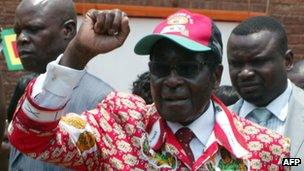
Robert Mugabe divides opinion in neighbouring South Africa
"All they see is the arrogance of a 'blue light brigade' [a reference to police escorts for leaders] that believes it has some divine right to rule," he wrote.
"They see a criminal 'Breitling brigade' [named after the German designer watch] that grows fat on looting the public coffers, stealing tenders and licences, and pocketing public funds budgeted for textbooks, toilets and libraries."
Adding his voice to the debate, another anti-apartheid stalwart, Pallo Jordan, called for "dignified and moral" leaders to be at the helm.
"The leadership of the ANC has been stripped of its dignity. The ANC has lost legitimacy," Mr Jordan reportedly said.
For now, Mr Malema is filling the breach left by the ANC top brass.
He appeals to many poor people despite the fact that his critics say he too is part of the "Brietling brigade", having allegedly improperly benefited from government tenders - a charge he has repeatedly denied - and for which he is being investigated by anti-corruption agencies.
He also counts as his friends tycoons such as Kenny Kunene, a convicted criminal who caused an uproar last year for throwing parties where he ate sushi off the bodies of semi-naked women.
"The thing about Mr Malema is that when there is a poverty-related protest, he is there. He fills a leadership vacuum. That is how he has remained relevant," says Mr Gumede.
- Published8 September 2012
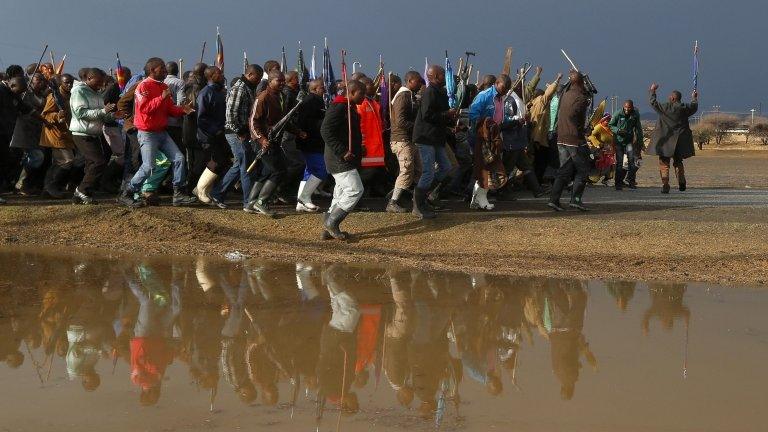
- Published3 September 2012
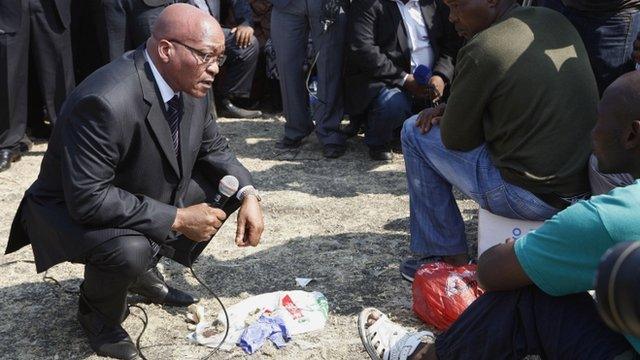
- Published8 May 2024
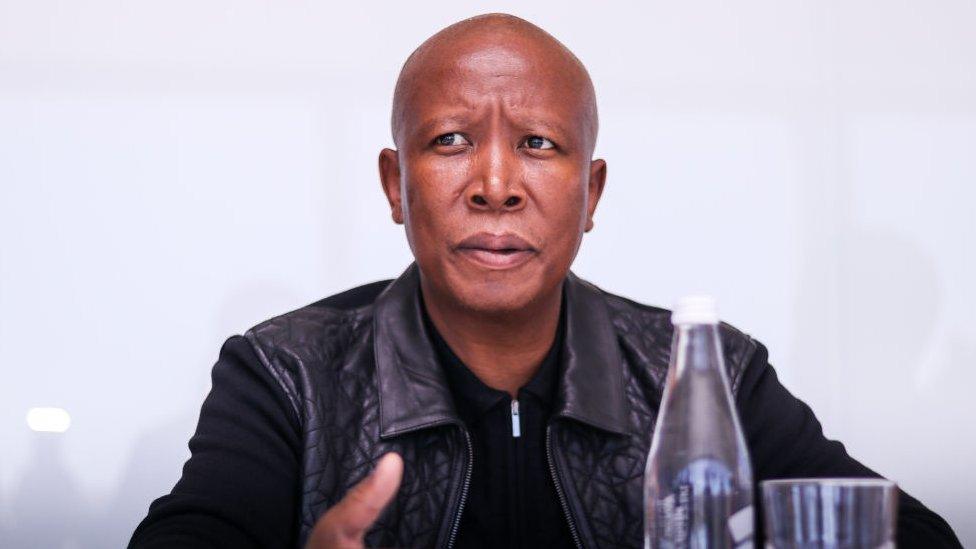
- Published21 September 2012
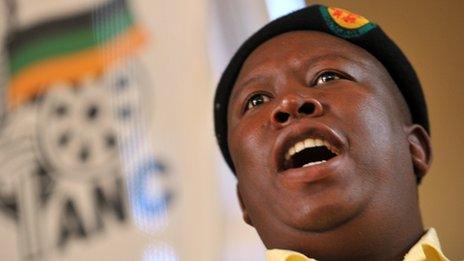
- Published24 August 2012
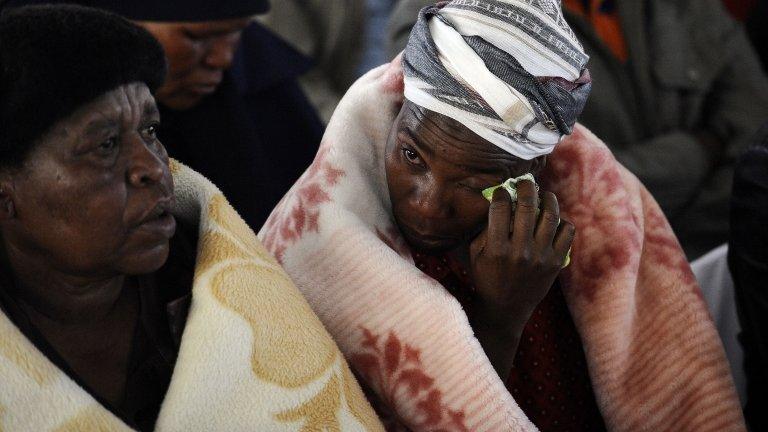
- Published23 August 2012
